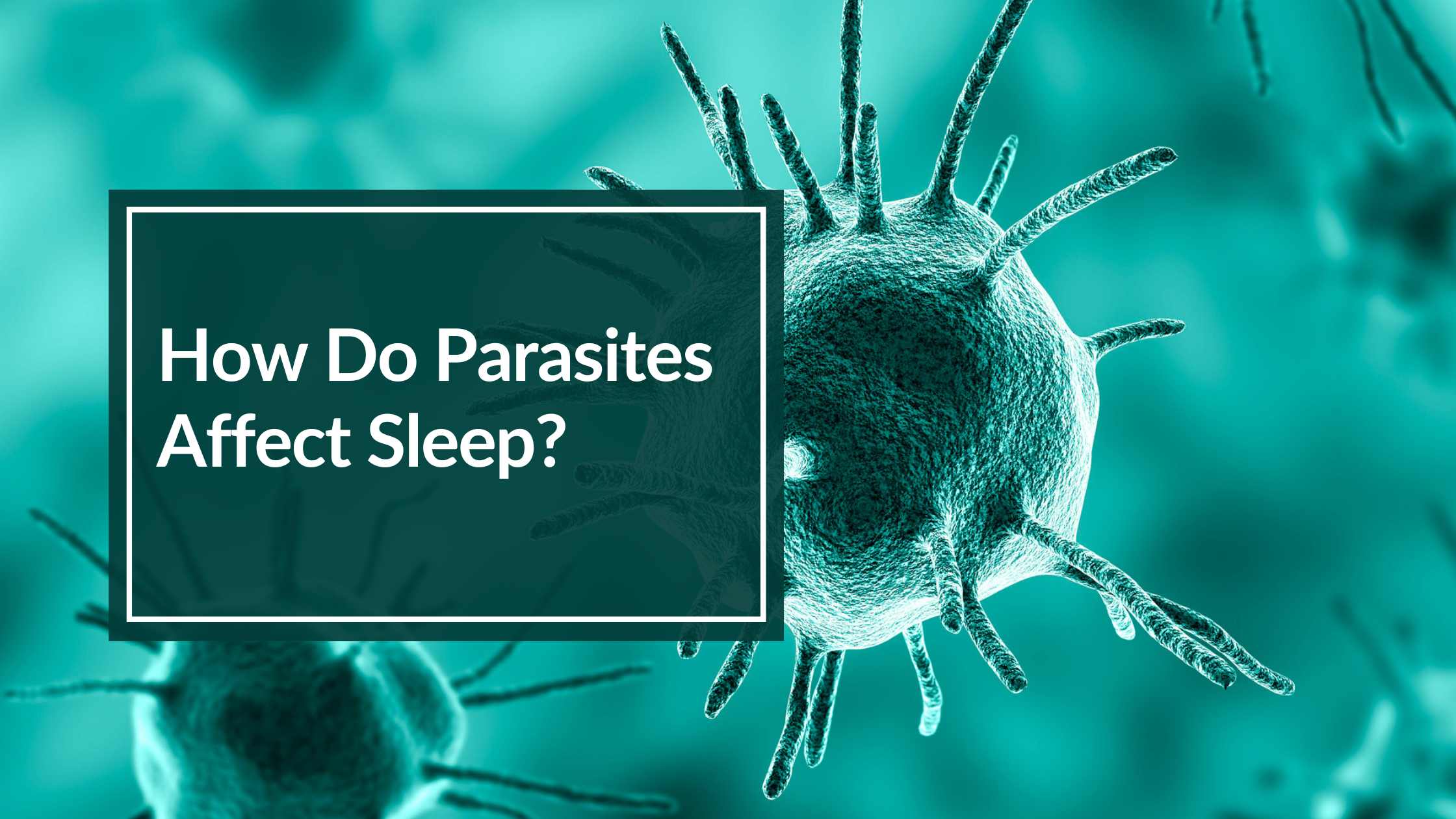
Have you heard that parasites affect sleep?
Imagine lying in bed, the darkness enveloping you, the silence calming you. You close your eyes in anticipation of a peaceful night’s rest, only to find yourself tossing and turning, remembering that Instagram Post on how parasites affect sleep!
Tossing and turning is a common experience for those suffering from sleep disturbances. But are parasites a factor? They might be if you are lying in bed with an itchy bottom. This is one way that parasites, or the common pinworm, affect sleep.
It’s always frustrating lying awake at night.
ANY sleep disturbance can have profound effects on your physical health, mental wellbeing, and overall quality of life. Lack of sleep can lead to fatigue, mood disorders, impaired memory and cognitive function, and even chronic health conditions like heart health, blood sugar, and weight issues.
Many things affect sleep, and adjusting your sleep hygiene can help. But parasites?
Yes, you heard right, parasites.
It may sound like something out of a horror movie, but these tiny organisms can wreak havoc on your sleep.
The Connection Between Sleep and Health
Before embarking on a parasite cleanse and how parasites affect sleep, let’s remind ourselves about the link between sleep and health. Sleep isn’t just a time for your body to rest; it’s a time for your body to heal, repair, and prepare for the next day. Without adequate sleep, your body cannot function at its best.
We detoxify while sleeping. Our brain does this through the Glymphatic System
Lack of sleep can lead to a weakened Immune System, making you more susceptible to illnesses and infections. If you are already sleep deprived, you may be vulnerable to the total body load that existing parasites may place on the Immune System.
On the other hand, getting enough quality sleep can boost your Immune System, improve your cognitive function, and reduce your risk of chronic health issues. It can also improve your mood, energy levels, and overall quality of life. Therefore, identifying and addressing any factors, such as parasites, could potentially support better sleep.
What Are Parasites?
So, what exactly are parasites? In the simplest terms, parasites are organisms that live on or in a host organism and get their food at the expense of their host. They can range in size from tiny, single-celled organisms to large worms. Parasites can be found everywhere, from the food we eat and the water we drink, to the pets we keep.
Parasites can cause a wide range of health problems, depending on the type of parasite and the severity of the infection. Some parasites may cause mild symptoms like itching or stomach discomfort, while others can cause serious health problems like anemia, malnutrition, or organ damage.
It’s also worth noting that not all parasites cause disease. Some parasites can live in your body without causing any noticeable symptoms. We call any organism like this “commensal.”
However, even these “silent” parasites affect sleep, and your health, in subtle ways.
Read more about parasites on our Should I Do A Parasite Cleanse post!
How Parasites Affect Sleep
You may be wondering, how can parasites influence sleep? The answer lies in the complex interactions between parasites, your immune system, and your sleep-wake cycle.
Here’s 3 ways that parasites affect sleep:
- Many parasites are nocturnal, meaning they are more active at night.
This can lead to symptoms like itching, discomfort, or restlessness that can disrupt your sleep. Itching is common with pinworms, also called threadworms, from the helminth. Many School aged children develop pinworm as it is “one of the most common helminth infections in the world, with most cases occurring in children.” (1) - Your body’s immune response to the parasites can also disrupt your sleep.
When your immune system detects the parasites, it releases chemicals called cytokines to fight off the infection. These cytokines can affect your sleep-wake cycle, leading to sleep disturbances. - The stress and anxiety caused by a parasitic infection can also impact your sleep.
Knowing that you have parasites can lead to feelings of discomfort, disgust, or fear, which can make it harder to fall asleep or stay asleep. - Parasites may have their own circadian rhythm. This helps maximize the efficient use of their energy, their ability to replicate, thus ensuring their survival (2).
The Research and How Parasites Affect Sleep.
There is a growing body of research highlighting the link to how parasites affect sleep.
Parasites may alter sleep through the immune response, or through the direct effects of them. They are multicellular creatures that know how to manipulate behavior to keep the infection going and complete their life cycle. They may exploit you, the host, because your response to stimuli is lower in the sleeping state. (1)
This study here highlights the relationship between more sleep, and a more robust immune system. They looked at 26 species of mammals and used the amount of white blood cells as a marker for robustness in the immune system. The more sleep the mammal got, the higher the number of white blood cells in the system. They concluded the better the sleep, the better the protection from parasites.
Are you a Holistic Health Practitioner? Want to learn more about bioenergetic testing and parasites?
Click here to learn more!

Species of Parasites that Affect Sleep.
- Malaria (plasmodium) parasites.
These parasites are transmitted through the bite of an infected mosquito. They can cause fever, chills, and night sweats, which can disrupt sleep. However, Plasmodium species are also somnogenic, that is they induce sleep to evade host defenses and establish themselves (1). - Human African Trypanosomiasis (HAT).
These parasites cause sleeping sickness, a disease characterized by severe sleep disturbances, including an inverted sleep-wake cycle. This parasite may be disrupting the host circadian rhythm through infiltration of the Central Nervous System, thus causing inflammation and disruption in circadian rhythm. - Giardia.
This parasite can cause diarrhea, stomach cramps, and nausea, which can disrupt sleep. The interesting thing about this particular parasite is that it caused EXCESS daytime sleepiness in 31.5% of people sampled in the study, and insomnia was experienced by 15.4% of participants (3). - Filariasis.
This parasite affects the Lymph System, and also travels to the Central Nervous System, causing insomnia, headache and irritability.
Use Prevention to Prevent How Parasites Affect Sleep.
The best way to prevent how parasites affect sleep is to prevent parasite infections in the first place. This involves practicing good hygiene, such as washing your hands regularly, especially:
- before eating
- after using the toilet
- drinking clean, safe water
- cooking food thoroughly to kill any parasites.
If you suspect that parasites are causing your sleep disturbances, it’s time to investigate.
While we always advocate for visiting a licensed healthcare professional, many seek holistic measures like bioresonance testing to find any links between sleep and parasites.
When approaching a parasite cleanse in this manner, you are also investigating the areas in need of support, before, during and after going through this process.
Not everyone should just start a parasite cleanse.
Supporting your sleep, elimination, digestion, and nourishment through this process is important. However, it’s also important to address any other factors that may be contributing to your sleep disturbances, such as Nervous System stress or poor sleep hygiene.
Top Takeaways if you Suspect Parasites Affect YOUR Sleep!
If parasites affect your sleep, it’s cool to read research, but what if you want to address this now? Besides using a Full Scan bioresonance test to learn about resonating energetic toxins, like parasites, here are five things you can do to prepare for addressing parasites. Notice we said prepare? Not everyone should get right to a parasite cleanse.
- Learn about your drainage pathways.
- Make sure you are taking in enough hydration.
- Pay attention to the fiber in your diet. Fiber acts as a binder, and a scrub brush in your gut.
- Include foods that support liver and bile.
- Avoid alcohol. Alcohol has a negative effect on your gut microbiome, and good bacteria actually move out bad guys like parasites.
Should you start on products that clear parasites? Not if you are breastfeeding, or pregnant, or have liver or kidney disease.
With that out of the way, there are two some simple products that you can try.
These two get things moving through your digestive tract and to support your liver.
- Mimosa pudica seed is a single ingredient, and it is in Para 1 from Cellcore Biosciences. It is a plant based supplement that helps scrub the gut wall, like fibrous foods do.
- Advanced TUDCA, which contains Tauroursodeoxycholic acid, TUDCA for short, along with NAC, melatonin, and humic and fulvic acids to support bile flow.
Understanding how parasites affect sleep can shed light on other aspects of our health. When we understand the complex interactions between the immune system and sleep, or how stressors, including toxins, can affect sleep, we can make changes to support these systems.
The next time you find yourself tossing and turning at night, consider the possibility that parasites might be the culprit. A good night’s sleep is crucial for good health, so don’t hesitate to seek support, and try a Full Scan if you’re experiencing sleep disturbances. This may reveal things like EMF, which negatively impacts sleep, and other environmental stressors that do NOT help with sleep hygiene.
